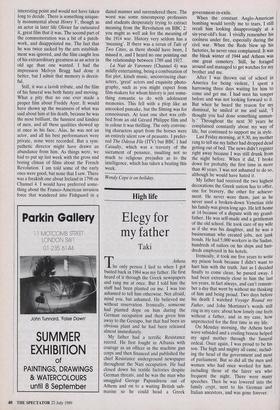High life
Elegy for my father
Taki
My father had a terrific Resistance record. He first fought in Albania with courage as an officer in the machine gun corps and then financed and published the chief Resistance underground newspaper throughout the Nazi occupation. He had closed down his textile factories despite German threats, and he was the man who smuggled George Papandreou out of Athens and on to a waiting British sub- marine so he could head a Greek government-in-exile.
When the constant Anglo-American bombing would terrify me to tears, I still recall him looking disapprovingly at a six-year-old's fear. I vividly remember his coolness under fire, especially during the civil war. When the Reds blew up his factories, he never once complained. It was the bleak winter of 1944 and Athens was one great cemetery. Still, he foraged around and managed to get watches for my brother and me.
After I was thrown out of school in America for being violent, I spent a harrowing three days waiting for him to come and get me. I had seen his temper before and was not looking forward to it. But when he heard the reason for my dismissal, he smiled at me and said, 'I thought you had done something unman- ly.' Throughout the next 30 years he complained constantly about my way of life, but continued to support me in style.
Last Friday morning, at 9.30, my mother rang to tell me my father had dropped dead getting out of bed. The news didn't register right away because I was still drunk from the night before. When it did, I broke down for probably the first time in more than 40 years. I was not ashamed to do so, although he would have hated it.
My father had received the two highest decorations the Greek nation has to offer, one for bravery, the other for achieve- ment. He never wore them, just as he never used a broken-down Venetian title his family was given long ago. He left home at 14 because of a dispute with my grand- father. He was self-made and a gentleman of the old school. He took care of my wife as if she was his daughter, and he was a businessman who created jobs, not junk bonds. He had 5,000 workers in the Sudan, hundreds of sailors on his ships and hun- dreds employed in his hotels.
Ironically, it took me five years to write my prison book because I didn't want to hurt him with the truth. Just as I. decided finally to come clean, he passed away. I had been extremely close to him the last ten years, in fact always, and can't remem- ber a day that went by without me thinking of him and being proud. Two days before his death I watched Voyage Round my Father, and John Mortimer's words still ring in my ears: about how lonely one feels without a father, and in my case, how unprotected for the first time in my life.
On Monday morning, the Athens heat wave subsided and a cooling breeze helped my aged mother through the funeral ordeal. Once again, I was proud to be his son. The high and mighty all came, includ- ing the head of the government and most of parliament. But so did all the men and women who had once worked for him, including those of the fairer sex who frequent the night. There were many speeches. Then he was lowered into the family crypt, next to his German and Italian ancestors, and was gone forever.


















































 Previous page
Previous page